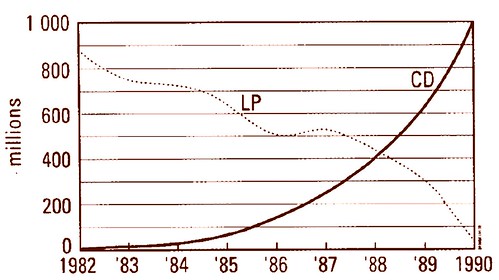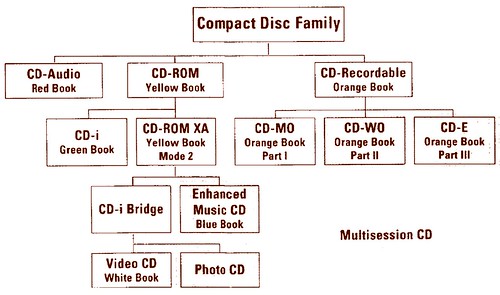Invent, don’t inhibit
26 May 20061982
25 years ago, the last real proof of innovation coming from the recording industry:
In 1979 Philips and Sony decided to join forces, setting up a joint task force of engineers whose mission was to design the new digital audio disc. Prominent members of the task force were Kees Immink and Toshitada Doi. After a year of experimentation and discussion, the taskforce produced the “Red Book”, the Compact Disc standard. (…)
According to Philips, the Compact Disc was thus “invented collectively by a large group of people working as a team.”
from en.wikipedia.org/wiki/Compact_disc
Three years of constructive working and a new technology was developed that was revolutionary superior.
In August 1982 the real pressing was ready to begin in the new factory, not far from the place where Emil Berliner had produced his first gramophone record 93 years earlier. (Deutsche Grammophon, Berliner’s company, had by now become a part of PolyGram). The first CD that was pressed in Hanover was a recording of Herbert von Karajan conducting the Alpine Symphony by Richard Strauß. In January 1983, 500 working days after the start of production, half a million CDs had been made.
from research.philips.com
The CD was an instant hit and made a lot of companies a lot of money:

2002
What major enhancements did the recording industry add to this?

In 1991 Philips tried the CD-i (interactive CD) which failed. In 1993 Sony released the SA-CD, introducing an imperceptible sound quality improvement in the hope of being able to charge even more than $20 for 1 hour of music. It’s not doing much either (only 3000 SA-CDs available).
In the mean time, the computer industry embraced the CD-ROM and CD-R, moved on to the DVD and will now jump on the HD-DVD/BluRay wagon. The music industry, on the other hand, only saw DVD as a delivery medium that’s slightly harder to copy, and allows adding some video and larger booklets in order to charge more.
The Fraunhofer Institute released the first MPEG1 Layer 3 encoder in 1994, within 5 years MP3 became the most disruptive technology to music distribution. The recording industry did basically nothing until 2000, when they sued Napster.
Bottom line: they sat on their *ss and just counted the money coming in.
Gracenote
One of the big advantages of MP3? It is a format that contains its own metadata: you can store Title, Artist, Genre, … in the ID3 tags. Where does that data come from? In most cases from online databases like Gracenote (formerly CDDB), MusicBrainz and FreeDB. External databases, because that info is not on the CD.
Now, isn’t is silly that in 20 years of CD product development no one has come up with a way to specify the album title and songs on the CD itself? This has me baffled. There’s plenty of empty space on an average music CD and the extra data is rarely bigger than 1KB. All you would need is a small TXT file that contains the titles, but is ignored by players that cannot interpret it. This is not only good for ripping music (something the music industry doesn’t like too much) but for any CD playing device. It’s silly that CDs give you impeccable digital sound but you still have to look up the titles of the album and songs in the CD notes.
Actually, I’m quite sure that the idea for adding song metadata to a CD has been suggested before within the recording companies. And their logic will have been: “we prefer that the customer needs the actual CD sleeve and booklet to enjoy the music fully. We think the extra work of needing to xerox the booklet is a good prevention of piracy. It might be more convenient for the customer, yes, since when is that an argument?”
iTunes
Nothing remarkable was done with commercial digital music distribution until 2003, when Apple started its iTunes Music Store. If anything, it showed that the consumer was ready to pay for digital music if the right (portable) carrier was there and if he could pick and choose at a transparent, predictable and reasonable price. Reaction of the majors on this first really successful initiative (that they didn’t sue – yet): we need variable (higher) pricing , less iPod and more DRM.
In 20 years, textbooks of (product) management and marketing will be filled with examples from the RIAA and IFPI: “how not to do it – why pissing off your customers is not a good strategy”.

